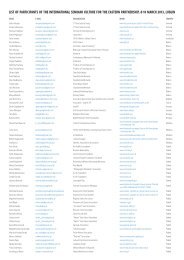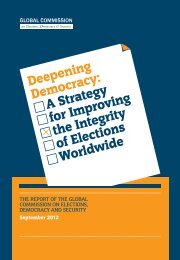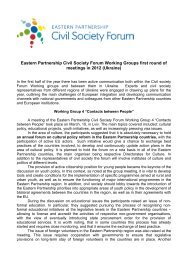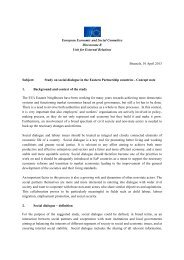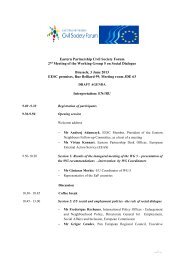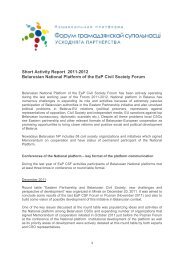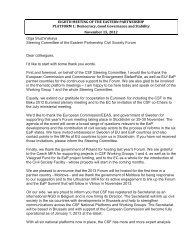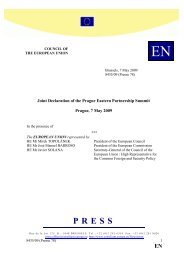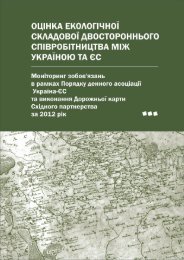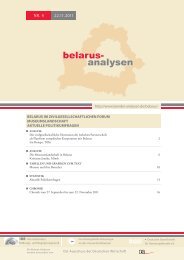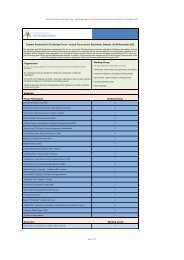Non-formal education - Eastern Partnership Civil Society Forum
Non-formal education - Eastern Partnership Civil Society Forum
Non-formal education - Eastern Partnership Civil Society Forum
Create successful ePaper yourself
Turn your PDF publications into a flip-book with our unique Google optimized e-Paper software.
well. In addition, NICARM gives references about qualifications to those of individuals who intend to<br />
continue their studies or work in foreign countries, and provides accurate information to state agencies,<br />
universities and businesses. Thus, today Armenia is implementing a feature of mutual recognition of<br />
diplomas and other documents confirming <strong>education</strong>in accordance with international and European<br />
standards.<br />
According to the RA law “On <strong>education</strong>”, the organizational basis of the state policy in the field of<br />
<strong>education</strong> is the state program of <strong>education</strong>. The current “State Program of Education Development<br />
for 2011-2015” was developed in accordance with the provisions of the National Security Strategy of<br />
the Republic of Armenia and “sustainable development programs.” The basis of the “State Program of<br />
Education Development for 2011-2015” was also formed by strategic programs for individual sectors of<br />
<strong>education</strong> and development concept approved by the Government of Armenia. The program, based on<br />
what we have in the field of <strong>education</strong>, is aimed at the gradual development with a focus on priorities<br />
and strategies.<br />
“State Program of Education Development for 2011-2015” proclaims, “The benchmark in the<br />
development of RA till 2015 should be the goals of “Millennium Declaration”, the global movement<br />
of “Education for All”, and the principles of the Bologna Declaration, the Strategy “Education For<br />
Sustainable Development “adopted by the UN Economic Commission for Europe and the “Programme<br />
of Action Keogo for 2005-2015. “ At the same time, the development of the <strong>education</strong> system should<br />
be aimed at improving the performance of global competitiveness in <strong>education</strong>, contributing to raise the<br />
overall competitiveness of Armenia.<br />
To achieve the goals of the strategy in the development of <strong>education</strong> until 2015 the following<br />
tasksare proclaimed:<br />
1. To raise the level of access to <strong>education</strong> at all levels, to create equal conditions for everyone to<br />
achieve the highest quality of <strong>education</strong> in accordance with his inclinations and abilities;<br />
2. To improve the quality of <strong>education</strong>, to bring it in line with international standards and ensuring<br />
the satisfaction of society and the business environment of <strong>education</strong>al services;<br />
3. To provide a permanent increase in the budget means to <strong>education</strong> and mechanisms for their<br />
effective use.<br />
Additional <strong>education</strong>, as an additional learning process aimed at improving the professional qualities<br />
of the individual is based on special <strong>education</strong> programs, professional development, and is defined in<br />
another law – the law “On the initial specialized (vocational) and secondary <strong>education</strong>.” Under this<br />
law, it can be implemented through training, professional development specialists within the craft and<br />
secondary specialized additional <strong>education</strong>al programs. At the same time the law determines additional<br />
vocational <strong>education</strong> as “learning” and this term in a number of laws and regulations is related to the<br />
field of vocational <strong>education</strong> and training (VET) and regarded as a synonym for additional <strong>education</strong>.<br />
Higher vocational additional <strong>education</strong> as a process of training and retraining of specialists is<br />
determined in the law “On Higher and Postgraduate Vocational Education”.<br />
Retraining, as a form of supplementary <strong>education</strong>, is mentioned in the law “On General Education”.<br />
Under this law, every five years teachers have to be certified, preceded retraining. Retraining is based<br />
on a program developed by the state authority. In the sphere of general <strong>education</strong> authorized state body<br />
also defines the requirements for the content of teachers’ training, approves the program of teachers’<br />
retraining.<br />
A term “adult <strong>education</strong>” in the legal field was first mentioned in the law “On the initial specialized<br />
(vocational) and Secondary vocational Education,” which, however, does not define it. It states only that<br />
the authorized management body of the RA Government and other bodies involved in the field of VET<br />
within their authority in the organization of <strong>education</strong> and training for adults, training of the employees of<br />
the sphere and the institutions of VET provide retraining and lecturers’ and trainers’ training, implement<br />
<strong>education</strong> and training programs for adults.<br />
Similar provisions exist in the law “On Higher and Post-Graduate Education,” according to which one<br />
of the tasks of the higher <strong>education</strong> institution is retraining of science teachers with higher <strong>education</strong>.<br />
A relation to permanent, including non-<strong>formal</strong>, <strong>education</strong> the law “On environmental <strong>education</strong> and<br />
<strong>education</strong> of the population” have, which is prominent from this point of view, because it is of great<br />
15



